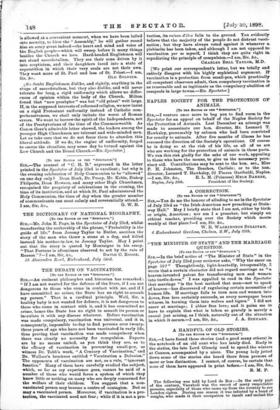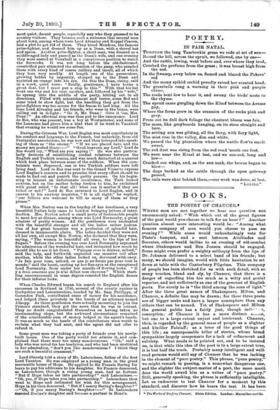A HANDFUL OF OLD STORIES.
[TO THE EDITOR OF THE " snociwros."]
SIR,—I have found these stories (and a good many others) 'ea the notebook of an old aunt who has lately died. Early in the sixties, the late Lord Glenelg used to spend the winters at Cannes, accompanied by a niece. The young lady jotted down some of the stories she heard there from persons of more or leas distinction. I cannot, of course, be certain that none of them have appeared in print before —I am, Sir, &e., E. M. P.
The following was told by Lord de Boa :—In the early part; of the century, Vauxhall was the resort of many respectable persons, especially of those who came up from the country to see London sights. During one season it was infested by a band of roughs, who made it their occupation to insult and molest the
most quiet, decent people, especially any who they guessed to be country visitors. They became such a nuisance that several men about town, among whom were Lord Alvanley and Keppel Craven, laid a plot to get rid of them. They hired Mendoza, the famous prize-fighter, and dressed him up as a Dean, with a shovel hat and apron. Another prize-fighter, a short man, was dressed as a middle-aged lady and passed as the Dean's wife, and one evening they were seated at Vauxhall in a conspicuous position to watch the fireworks. It was not long before the old-fashioned, countrified pair attracted the attention of the gang, who assailed them with every kind of coarse raillery and insult, all of which they bore very meekly. At length one of the persecutors, growing bolder by impunity, stepped up to the Dean and squirted an orange into his eye. On this the Dean, rising, said in a meek, quiet tone: "Really, gentlemen, I have borne a great deal, but I must put a stop to this." With that his hat went one way and his coat another, and, followed by his "wife," he sprang into the middle of the party, hitting out in all directions. Filled with astonishment and terror, some fled and some tried to show fight, but the handling they got from the prize-fighters was too severe for the fracas to last long. All the time Lord Alvanley and his friends, who were in the boxes, were calling out in delight : " Go it, Mr. Dean ! Give it 'em, Mrs. Dean !" An effectual stop was thus put to the annoyance. Lord de Ros, who was present, was a boy at Westminster, and some of the Lennoxes had given him a hint that if he went to Vauxhall that evening he would see some fun.
During the Crimean War, Lord Raglan was most conciliatory in his conduct and language to the French, but unluckily, from old Peninsular associations, he was now and then betrayed into speak- ing of them as " the enemy." " If we are placed here and the enemy are posted there—" " Good heavens, my Lord," Lord de Ros would cry, " What are you saying !" He was also particu- larly desirous of establishing cordial relations between the English and Turkish armies, and was much disturbed at a quarrel which took place between some of the soldiers. When the com- batants were dispersed, one or two Turkish soldiers were left lying dead. Lord de Ros was sent to the Grand Vizier to express Lord Raglan's concern and to promise that every effort should be made to find out and punish the guilty persons. On his begin- ning to lament an unfortunate occurrence, the Turk looked anxious, but on the matter being broken to him, he exclaimed with great relief, " Is that all ! what can it matter if they are killed or not ?" Lord de Ros returned to Lord Raglan, and in answer to his anxious inquiries, " It is all right," he replied, our fellows are welcome to kill as many of them as they please."
When Mrs. Norton was in the heyday of her loveliness, a very beautiful Italian lady came to London bringing letters of intro- duction. Mrs. Norton asked a small party of fashionable people to meet her at dinner, among whom was Lord Normanby, a great admirer of pretty women. All the gentlemen were enchanted with the beautiful stranger and all the ladies rather jealous. One of her great beauties was a profusion of splendid hair, dressed in innumerable plaits. The ladies decided they were not all her own, all except Mrs. Norton, who declared that they were, saying, "The woman is beautiful all over, to the tips of her fingers." Before the evening was over Lord Normanby expressed his admiration of the wonderful hair, and intimated how much he should like to see it let down. " Puisque vows le desires, milord," said the lady, and forthwith unplaited one massive coil after another, while the other ladies looked on, devoured with envy. " Je fais pour vows, milord, ce que je ne ferais pas pour tout le monde," said the houri, casting up her fine eyes at the enraptured Lord Normanby, from under her mantle of flowing locks. " 11 y a trois semaines que je n'ai defait roes cheveux." Which start- ling announcement in some degree consoled the English dames for their inferior locks.
When Charles Edward began his march to England after his successes in Scotland in 1746, several of the county squires in Derbyshire and Leicestershire, headed by Mr. Sam Phillipps, of Garendon Park, contributed sums of money for his assistance, and lodged them privately in the bands of an attorney named Allsopp. As these gentlemen were actually mounting to join the Prince's standard, they got the news that he was in retreat. They no doubt congratulated themselves on having taken no incriminating steps, but the awkward circumstance remained of the considerable sum of money lodged in the agent's hands. It was as much as the heads of the contributors were worth to reclaim what they had sent, and the agent did not offer to refund it.
Some great man was taking a party of friends over his newly- built house. One of the party would not admire it, and com- plained that there were too many anachronisms. "Oh," said a lady who was noted for her toadyism, and who had been unstinted in her admiration, " don't you like anachronisms ? I think they are such a beautiful ornament."
Lord Glenelg told a story of Mr. Labouchere, father of the first Lord Taunton. He was employed as a young man in the great mercantile house of Hope. He applied to Sir Francis Baring for leave to pay his addresses to his daughter. Sir Francis demurred, as Labouchere, though a rising young man, had no fortune. "But if Hope takes me into partnership ?" said Labouchere.— " Oh, yes, if Hope takes you into partnership." Labouchere then went to Hope and intimated his wish for this arrangement. Hope in his turn demurred. " But if I marry Baring's daughter ?" —" Oh, if you marry Baring's daughter—" So Labouchere married Baring's daughter and became a partner in Hope's.



































 Previous page
Previous page